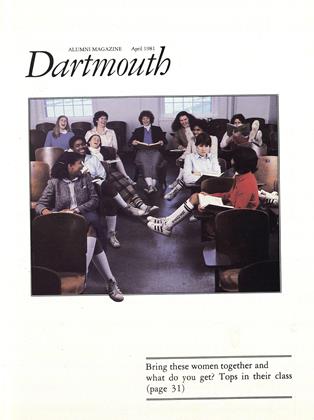Frederick C. Mosher '34, The GAO: TheQuest for Accountability in AmericanGovernment. Westview Press, 1979. 387 pp. A thorough study of the General Accounting Office, this book is divided into two interdependent parts, the first "a straightforward descriptive history" of the G.A.O. from the time of its establishment in 1921 to the present, the second an "intensive analysis of the roles of the G.A.O. in American government and society today." Mosher's theme, however, is accountability, and he deals with such questions as the managerial and constitutional questions posed by the unique, semi-independent status of the G.A.O. in government, the G.A.O.'s relationships with both the executive and legislative branches, and its relationship with outside institutions. Mosher teaches political science at the University of Virginia.
Michael Mooney '61, Squid Soup. Story Press, 1980. 150 pp. Michael Mooney, a talented new fiction writer who published his first book a novella called Names a little over a year ago, has now followed his initial success with a collection of short stories, 12 in all. "The stories focus," Mooney writes, "on the relationship between men and women, husbands and wives, and from the point of view of the man, on how the woman gets identified with the world in general, its recalcitrance, its indifference, its otherness." True enough, but perhaps just a shade too solemn. For each of the stories bears witness, without exception, to its author's keen sense of humor. Mooney is a serious writer with a serious theme, but solemn he is not. His humor seems more medieval than modern: wry, whimsical, with an occasional touch of the macabre, often uproariously ribald.
John A. Hodgson '67, Wordsworth'sPhilosophical Poetry, 1797-1814. University of Nebraska, 1980. 216 pp. A scholarly history of Wordsworth's metaphysical beliefs as they changed and developed during the most poetically productive phase of the poet's career. The study proceeds on two levels as Hodgson traces first the poet's "patterned, dialectical progression" through four distinct but continuous stages of beliefs concerning godhead and immortality, and then turns his attention to an analysis of how Wordsworth incorporated his changing metaphysical concepts into his poetry. The result, Hodgson concludes, was "neither the transcendental nor the 'apocalyptic' poetry we are usually taught to see, but some of the noblest humanistic poetry in the language."
 View Full Issue
View Full Issue
More From This Issue
-
 Feature
FeatureTenure: an academic necessity
April 1981 By A. E. DeMaggio -
 Feature
FeatureQuestion: Who are the Arts for and, Indeed, Who Owns Dartmouth?
April 1981 By Peter Smith -
 Feature
FeatureTenure: the tragedy of the slaughterhouse
April 1981 By Peter W. Travis -
 Cover Story
Cover StoryTops in Their Class
April 1981 -
 Cover Story
Cover StoryChargé d'Affaires
April 1981 -
 Cover Story
Cover StoryBeethoventorte
April 1981
Article
-
 Article
ArticleThe Dartmouth College Alumni Fund on The Tucker Foundation CLASS AGENTS—I 929 CAMPAIGN
APRIL 1929 -
 Article
ArticleHandel Society Performs
June 1933 -
 Article
ArticleCommencement Closes 172nd Year
July 1941 -
 Article
ArticleGovernment Internship
March 1946 -
 Article
ArticleTHE AUTHOR:
FEBRUARY 1972 -
 Article
ArticleLowell
January 1940 By A. F. Woodies '14

